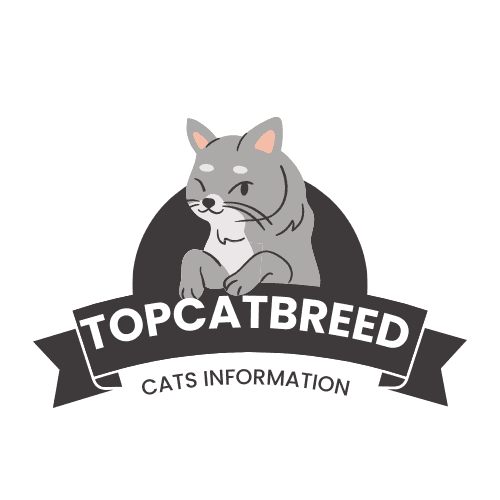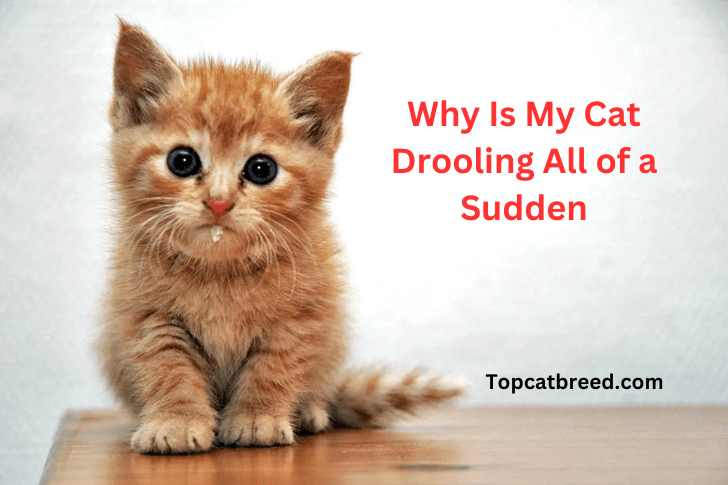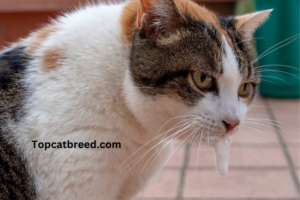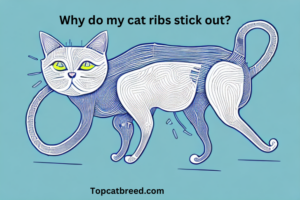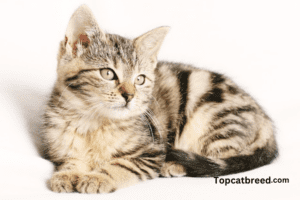If you’ve ever noticed your feline friend suddenly drooling more than usual, you might find yourself asking, “Why is my cat drooling all of a sudden?” This unexpected change in behavior can be concerning for cat owners, but understanding the potential reasons behind it can help alleviate worries and ensure your cat’s well-being.
There are several factors that could contribute to sudden cat drooling, ranging from benign to more serious issues. Dental issues, such as gum disease or tooth decay, are common culprits. Similarly, nausea or gastrointestinal problems can prompt excessive drooling as cats may salivate more when they feel unwell. Additionally, poisoning or toxin ingestion, whether from household chemicals or certain plants, can lead to sudden drooling as a protective response. Foreign material stuck in the mouth, like a piece of string or a bone fragment, can also irritate the oral cavity and cause increased salivation. In the following sections, we’ll go more into the reasons for this and look at additional possible causes of sudden cat drooling. Here are 9 possible reasons that your cat is suddenly drooling.
The Reasons Why Your Cat Is Suddenly Drooling
1-Dental Issues
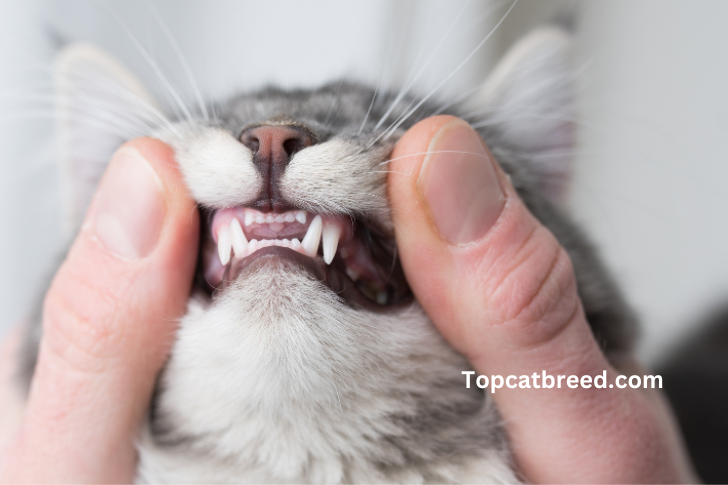
First important reasons of Why is my cat drooling all of a sudden is dental issues. “Dental disease is a prevalent concern among felines aged 4 years and older, affecting a substantial percentage ranging from 50% to 90%. This condition could potentially explain why your cat is experiencing excessive drooling. Various dental issues contribute to this, including the build-up of tartar, inflammation of the gums (gingivitis), the development of cavities, stomatitis, and feline oral resorptive lesions (FORL). If your pet’s drooling stems from dental problems, it’s likely accompanied by other observable symptoms, such as:
- Foul breath
- Difficulty eating or reluctance to eat
- Pawing at the mouth
- Bleeding gums
- Changes in behavior like irritability or lethargy
Regular dental care and check-ups are essential to prevent and address these issues, ensuring your feline companion maintains good oral health and overall well-being.”
2. Nausea or Gastrointestinal Problems
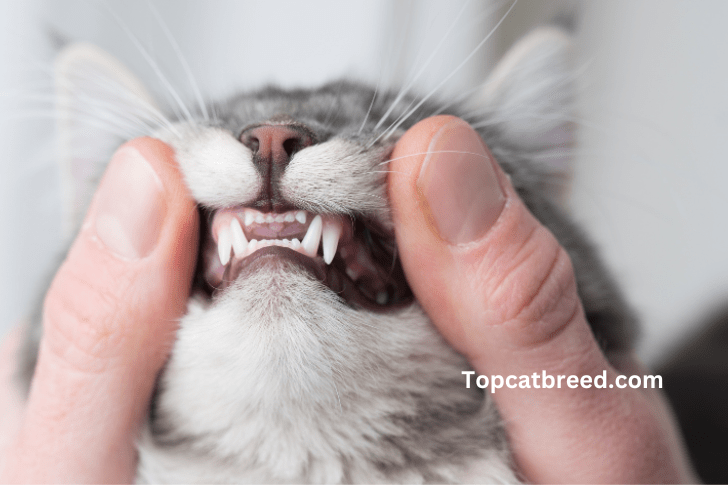
If you’ve noticed your cat suddenly drooling more than usual, it could be a sign of nausea or gastrointestinal issues. Just like humans, cats can experience upset stomachs and digestive discomfort, leading to excessive drooling. Nausea in cats can be caused by a variety of factors, including dietary indiscretion, ingestion of spoiled food, hairballs, or underlying medical conditions such as gastritis or inflammatory bowel disease.
When a cat is nauseous, they may exhibit other symptoms along with drooling, such as vomiting, lethargy, loss of appetite, or changes in litter box habits. If you suspect your cat is experiencing gastrointestinal problems, it’s essential to monitor their behavior closely and consult with your veterinarian for proper diagnosis and treatment.
Treatment for nausea and gastrointestinal issues in cats may include dietary adjustments, medications to alleviate symptoms, and addressing any underlying medical conditions. Ensuring your cat has access to fresh water and a balanced diet can also help prevent digestive upset and minimize drooling episodes.
3. Poisoning or Toxin Ingestion
Another possible reason for sudden drooling in cats is poisoning or ingestion of toxins. Cats are curious by nature and may inadvertently come into contact with harmful substances both indoors and outdoors. Common toxins that can cause drooling in cats include certain plants (such as lilies), household chemicals, pesticides, medications, and even certain human foods like onions, garlic, and chocolate.
If you worry your cat has eaten a dangerous substance, seek emergency veterinarian attention. In addition to excessive drooling, poisoning in cats can cause vomiting, diarrhea, trouble breathing, convulsions, and loss of coordination. Prompt treatment is critical to reducing the toxin’s effects and preventing consequences.
To prevent cat poisoning, keep potentially toxic items out of reach, extensively investigate any plants or foods before bringing them into your home, and use pet-safe cleaning and pest control products.
4. Foreign Material in the Mouth
Sometimes, sudden drooling in cats can be caused by the presence of foreign material in the mouth or throat. Cats are notorious for their curiosity and may chew on objects or play with small items that can become lodged in their mouth or throat, leading to discomfort and drooling.
String, dental floss, tiny toys, bones, and bits of cloth are all examples of foreign items that might induce cats to drool. If a foreign item becomes lodged in your cat’s mouth or throat, it might irritate the tissues and cause profuse drooling as a normal reaction.
If you believe your cat has anything lodged in their mouth, approach the issue cautiously to prevent injuring yourself or causing extra struggling to your cat. Attempting to remove the object on your own may exacerbate the problem, so get veterinarian treatment as soon as possible.
5. Trauma to the Mouth
If your cat is suddenly drooling more than usual, it could be due to trauma to the mouth. Cats are naturally curious and may engage in activities that put them at risk of injury, such as exploring rough terrain or getting into scuffles with other animals.
Trauma to the mouth can result from a variety of causes, including falls, conflicts, and accidents. Common injuries include cuts, abrasions, and even fractures of the teeth or jaw. Trauma to the mouth of a cat can cause pain, swelling, and discomfort, leading in excessive drooling as a reaction to the injury.
If you feel your cat has suffered oral trauma, you should thoroughly inspect them for any symptoms of injury and seek veterinarian assistance as soon as possible. Pain management, antibiotics to avoid infection, and maybe dental operations to repair any damage to the teeth or jaw are all possible treatments for mouth injuries.
6. Heatstroke or Overheating
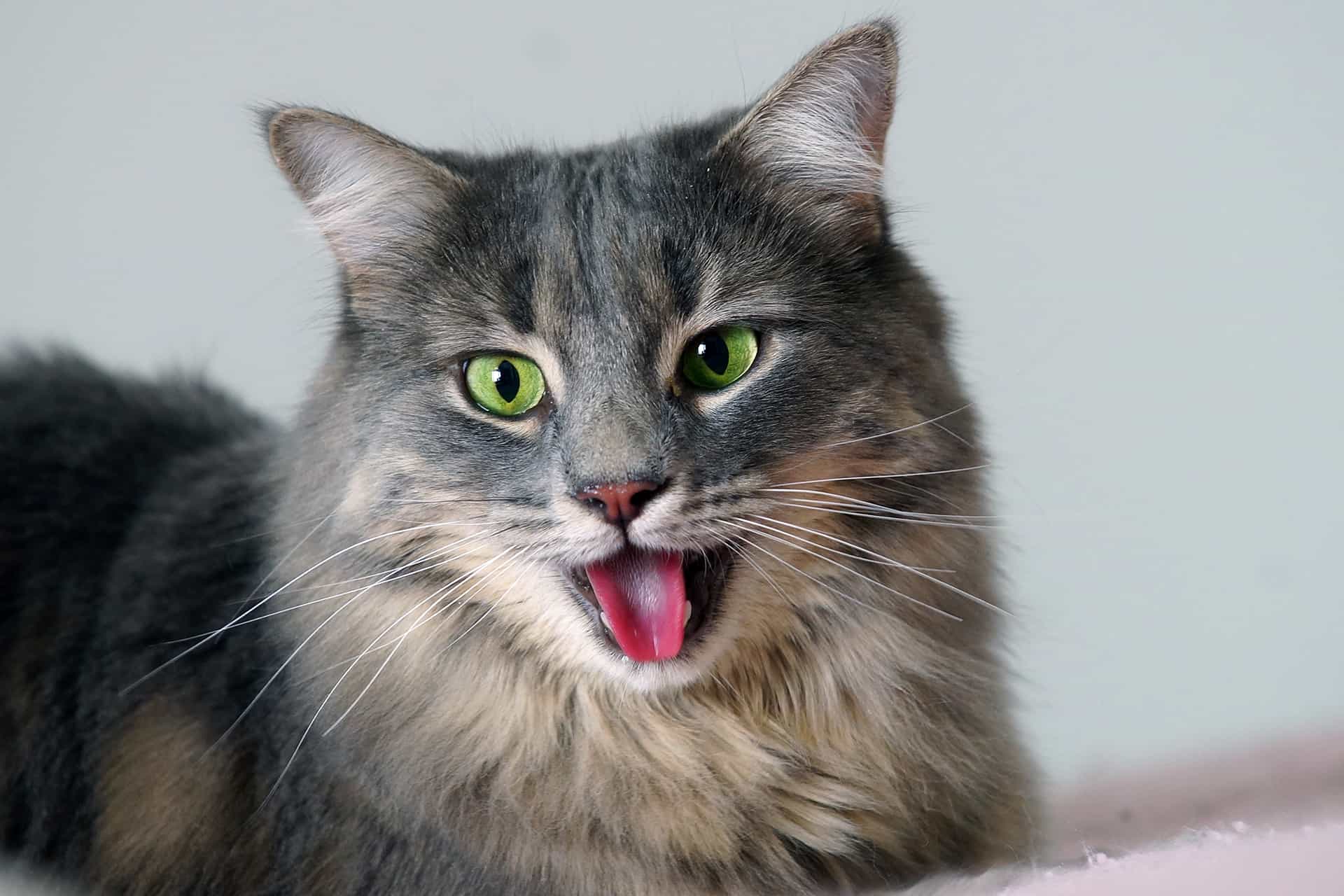
Heatstroke or overheating can also cause sudden drooling in cats, especially during hot weather or in environments with poor ventilation. Cats are more susceptible to heat-related illnesses than some might think, as they have limited ability to cool themselves down compared to humans.
When a cat feels hot, their body temperature increases, resulting in excessive panting and drooling as their natural cooling processes take control. Heatstroke, if left untreated, can lead to dehydration, organ damage, and even death.
To prevent heatstroke in cats, make sure they have access to cool, shady locations, enough of fresh water, and avoid keeping them in hot automobiles or cramped rooms without proper ventilation. If you feel your cat is suffering from heatstroke, relocate them to a cooler place right away and seek veterinarian care for effective treatment.
7. Oral Ulcers or Lesions
Oral ulcers or lesions can be another cause of sudden drooling in cats. These painful sores can develop on the gums, tongue, or inside of the cheeks, making it uncomfortable for the cat to eat, drink, or groom themselves properly.
Oral ulcers and lesions can be caused by a variety of reasons such as viral infections, dental disease, immune system abnormalities, or oral trauma. Aside from drooling, cats with oral ulcers may display reduced appetite, reluctance to feed, and persistent pawing at the mouth.
If you believe your cat has oral ulcers or lesions, you should have them evaluated by a veterinarian to ensure correct diagnosis and treatment. Medication to relieve pain and inflammation may be used in combination with treating the underlying cause of the ulcers.
8. Neurological Conditions
Neurological conditions can also contribute to sudden drooling in cats. These conditions affect the nervous system, leading to disruptions in normal bodily functions, including the regulation of saliva production.
Drooling in cats can be caused by neurological diseases such as seizures, brain tumors, or nerve damage. Other indications of neurological disorders in cats, in addition to drooling, include tremors, weakness, and behavioral abnormalities.
If you believe your cat has a neurological issue, you should seek veterinarian care for correct diagnosis and treatment. Treatment for neurological problems in cats varies according to the underlying cause and severity of the symptoms, and may include drugs, surgery, or supportive care.
9-Respiratory Infections
Respiratory infections can be a reason behind your cat suddenly drooling excessively. Cats, like humans, are susceptible to respiratory infections caused by viruses or bacteria. Common respiratory infections in cats include feline viral rhinotracheitis (FVR), feline calicivirus (FCV), and feline infectious peritonitis (FIP).
When a cat has a respiratory infection, it can cause inflammation in the nasal passages, sinuses, throat, and even the lungs. This inflammation can produce discomfort and irritation, resulting in increased saliva production and consequent drooling.
Other signs of a respiratory illness in cats include sneezing, coughing, nasal discharge, tiredness, lack of appetite, and trouble breathing. If you believe your cat has a respiratory infection, get veterinarian care right once to ensure correct diagnosis and treatment.
Treatment for respiratory infections in cats may include supportive care, such as keeping the cat comfortable and hydrated, as well as drugs to ease symptoms and battle the underlying illness. In extreme situations, hospitalization and rigorous therapy may be required.
To prevent respiratory infections in cats, keep them indoors to limit exposure to other diseased animals, ensure they are up to date on immunizations, and practice proper cleanliness to lower the likelihood of transmission. Regular veterinarian check-ups can also help detect possible infections early and prevent them from progressing to more serious diseases.
Signs and Symptoms to Observe in Your Cat
Being aware of the signs and symptoms will help you determine whether your cat’s drooling is reason for concern. Common indicators to look for include excessive drooling beyond regular grooming, changes in appetite or feeding habits, pawing at the mouth, foul breath, swollen or bleeding gums, and behavioral changes like as irritation or lethargy.
It’s also vital to note whether you see any vomiting, diarrhea, trouble breathing, or other troubling symptoms with the drooling. Regularly monitoring your cat’s health and behavior allows you to spot any irregularities early on, allowing you to intervene and provide correct care to keep your feline buddy healthy.
Knowing When to Seek Veterinary Attention for Your Cat
If you detect sudden or chronic drooling in your cat, particularly if it is accompanied by any of the aforementioned signs and symptoms, get veterinarian assistance right once. While some drooling after eating or grooming is acceptable, excessive or persistent drooling may suggest an underlying health problem that needs expert examination and treatment. Additionally, if your cat has consumed a hazardous substance, has a foreign item trapped in their mouth, or is having difficulties breathing, they require rapid veterinarian attention. Trust your instincts as a pet owner—if you’re not sure if your cat’s drooling necessitates a vet visit, it’s always best to err on the side of caution and seek expert help.
Your veterinarian can do a complete examination, detect any underlying issues, and offer suitable medication to alleviate your cat’s drooling while also ensuring their health and wellbeing. Regular veterinarian check-ups can also help detect any problems early and prevent them from becoming more serious.
FAQS
1. Why does my cat drool when I pet him?
Cats may drool when being petted due to an instinctual response called “purr drooling.” This occurs when a cat becomes deeply relaxed and content during petting, triggering the production of excess saliva.
2. Is cat drool harmful to humans?
Generally, cat drool is not harmful to humans. However, it’s essential to practice good hygiene, especially if you have allergies or compromised immune systems.
3. Is there treatment for excessive cat drooling?
Treatment for excessive cat drooling depends on the underlying cause. Your veterinarian can diagnose the issue and recommend appropriate treatment, which may include dental care, medication, or lifestyle changes.
Conclusion
Understanding Why is my cat drooling all of a sudden is crucial for ensuring their health and well-being. Whether it’s due to dental issues, respiratory infections, or other factors, being attentive to signs and symptoms can help you identify when your cat needs veterinary attention. By providing proper care and seeking timely treatment, you can help your feline companion stay happy and healthy for years to come.
